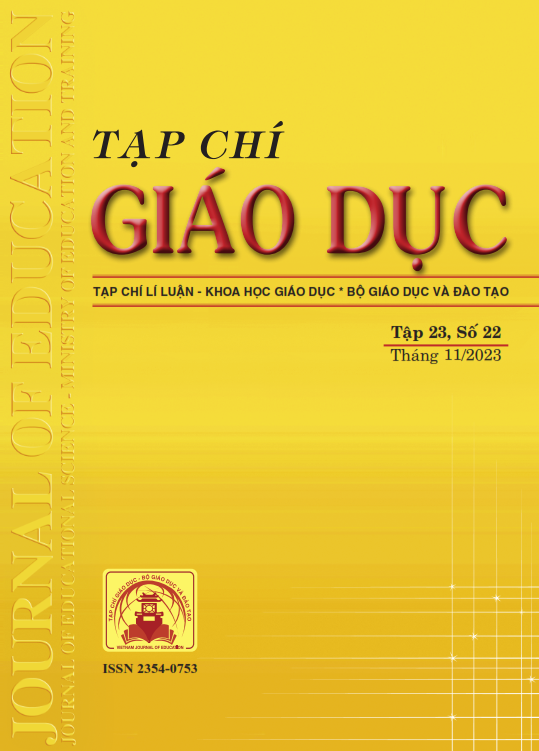Đề xuất thang đo xác định các yếu tố ảnh hưởng đến sự sẵn sàng thực hiện giáo dục STEAM trong dạy học môn Công nghệ của giáo viên tiểu học
Tóm tắt
STEAM education is known as a beneficial teaching model with learners. However, during the implementation of STEAM education in high schools, teachers are influenced by many factors, which can be a driving force or a barrier to their readiness to implement STEAM education. This study proposes a scale to evaluate factors affecting elementary school teachers' readiness to implement STEAM education in teaching Technology. The study validated the scale based on the following criteria: reliability, convergent validity and discriminant validity of the scale. The criteria proposed in the survey toolkit are appropriate to the characteristics of primary school teachers and the context in Vietnam.
Tài liệu tham khảo
Bộ GD-ĐT (2020). Công văn số 3089/BGDĐT-GDTrH ngày 14/8/2020 về việc triển khai giáo dục STEM trong giáo dục trung học.
Bộ GD-ĐT (2023). Công văn số 909/BGDĐT-GDTH ngày 08/3/2023 về việc hướng dẫn tổ chức hoạt động giáo dục STEM ở tiểu học.
Boru, N. (2018). The factors affecting teacher-motivation. International Journal of Instruction, 11(4), 761-776.
Churchill, G. A. (1979). A Paradigm for developing better measures of marketing constructs. Journal of Marketing Research, 16, 64-73. https://doi.org/10.2307/3150876
Ecevit, T., & Kingir, S. (2022). Primary Student Teachers' Teaching-Learning Conceptions, Attitudes and Self-Efficacy Beliefs toward Science Teaching. Journal of Turkish Science Education, 19(3), 773-785. https://doi.org/10.36681/tused.2022.149
Hair, J. F., Hult, G. T., Ringle, C. M., & Sarstedt, M. (2021). A primer on partial least squares structural equation modeling (PLS-SEM) (3nd ed.). Thousand Oaks, CA: Sage.
Henseler, J., Ringle, C. M., & Sarstedt, M. (2015). A new criterion for assessing discriminant validity in variance-based structural equation modeling. Journal of the Academy of Marketing Science, 43(1), 115-135. https://doi.org/10.1007/s11747-014-0403-8
Herro, D., Quigley, C., & Cian, H. (2019). The challenges of STEAM instruction: Lessons from the field. Action in Teacher Education, 41(2), 172-190. https://doi.org/10.1080/01626620.2018.1551159
Keay, J. K., Carse, N., & Jess, M. (2019). Understanding teachers as complex professional learners. Professional Development in Education, 45(1), 125-137. https://doi.org/10.1080/19415257.2018.1449004
Kim, Y. H., & Na, S. I. (2022). Using structural equation modelling for understanding relationships influencing the middle school technology teacher’s attitudes toward STEAM education in Korea. International Journal of Technology and Design Education, 32(5), 2495-2526. https://doi.org/10.1007/s10798-021-09708-z
Kline, R. B. (2016). Principles and Practice of Structural Equation Modeling (4th ed.). The Guilford Press.
Le, T. X., & Bui, V. H. (2021). STEM Teaching Skills of Primary School Teachers: The Current Situation in Ho Chi Minh City, Vietnam. Journal of Education and e-Learning Research, 8(2), 149-157. https://doi.org/ 10.20448/journal.509.2021.82.149.157
Li, J., Luo, H., Zhao, L., Zhu, M., Ma, L., & Liao, X. (2022). Promoting STEAM education in primary school through cooperative teaching: A design-based research study. Sustainability, 14(16), 103-133. https://doi.org/10.3390/su141610333
McClelland, D. C. (1987). Human motivation. Cambridge University Press.
Nordgren, K., Kristiansson, M., Liljekvist, Y., & Bergh, D. (2021). Collegial collaboration when planning and preparing lessons: A large-scale study exploring the conditions and infrastructure for teachers’ professional development. Teaching and Teacher Education, 108, 1-11. https://doi.org/10.1016/j.tate.2021.103513
Park, H., Byun, S. Y., Sim, J., Han, H. S., & Baek, Y. S. (2016). Teachers’ perceptions and practices of STEAM education in South Korea. Eurasia Journal of Mathematics, Science and Technology Education, 12(7), 1739-1753. https://doi.org/10.12973/eurasia.2016.1531a
Shahali, E. H. M., & Halim, L. (2023). The Influence of Science Teachers’ Beliefs, Attitudes, Self-Efficacy and School Context on Integrated STEM Teaching Practices. International Journal of Science and Mathematics Education, 1-21. https://doi.org/10.1007/s10763-023-10403-9
Timotheou, S., & Ioannou, A. (2021). Collective creativity in STEAM Making activities. The Journal of Educational Research, 114(2), 130-138. https://doi.org/10.1080/00220671.2021.1873721
Wolgast, A., & Fischer, N. (2017). You are not alone: Colleague support and goal-oriented cooperation as resources to reduce teachers’ stress. Social Psychology of Education: An International Journal, 20(1), 97-114. https://doi.org/10.1007/s11218-017-9366-1
Wu, P., Yang, L., Hu, X., Li, B., Liu, Q., Wang, Y., & Huang, J. (2022). How K12 Teachers’ Readiness Influences Their Intention to Implement STEM Education: Exploratory Study Based on Decomposed Theory of Planned Behavior. Applied Sciences, 12(23), 11989. https://doi.org/10.3390/app122311989
Tải xuống
Đã Xuất bản
Cách trích dẫn
Số
Chuyên mục
Giấy phép

Tác phẩm này được cấp phép theo Ghi nhận tác giả của Creative Commons Giấy phép quốc tế 4.0 .












